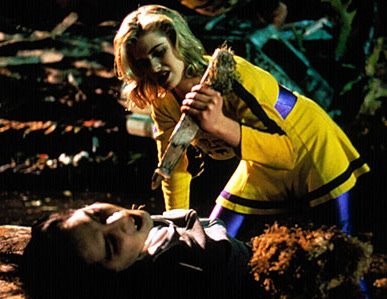Susan Sontag’s “Notes on Camp” was one of my favorite readings so far. I’m a huge, huge fan of campy stuff, but never realized that it had enough of a presence to warrant academic reflections on it.
I found Sontag’s essay interesting first because I never realized that “camp” extended beyond movies and TV. Who knew that Swan Lake is considered campy (something with which I completely agree)? Her mention of things like 18th-century “Art Nouveau” Tiffany lamps and the like offered a new perspective of just what the idea of “camp” means beyond the Buffy the Vampire Slayermovie.
A few lines in “Notes on Camp” made me laugh, but are also what I find to be wholly accurate descriptions of Camp: “The pure examples of Camp are unintentional; they are dead serious” and “Camp is art that proposes itself seriously, but cannot be taken altogether seriously because it is ‘too much.’”
I was a bit confused about Sontag’s need to clarify the relationship between “the homosexuals” and Camp: “Camp taste is much more than homosexual taste,” she says, and wastes about three paragraphs comparing the relationship between “the Jews” and liberalism with the one between “the homosexuals” and Camp. She fails to offer much of an explanation as to why this clarification is warranted and I wonder what influenced her decision to include it. I know that drag queens, crossdressing, and enhanced sexuality or sexual ambiguity can be aspects of Camp, and I wish that Sontag had ventured into it more – though I suppose that the fact that this was written in 1964 may have affected the tone and focus of the article.
Despite this weird argument, I found Sontag’s article to be interesting less because of its specific arguments but more because of its existence as a piece of academic writing: she mentions in the beginning that defining Camp may tarnish the cult of Camp, which I kind of agree with. I’m not sure a deep analysis of what I would call an accidental phenomenon is really necessary, but it’s interesting to look at attempts at giving a purposeful definition to it.



Add a comment